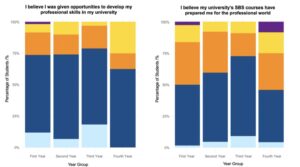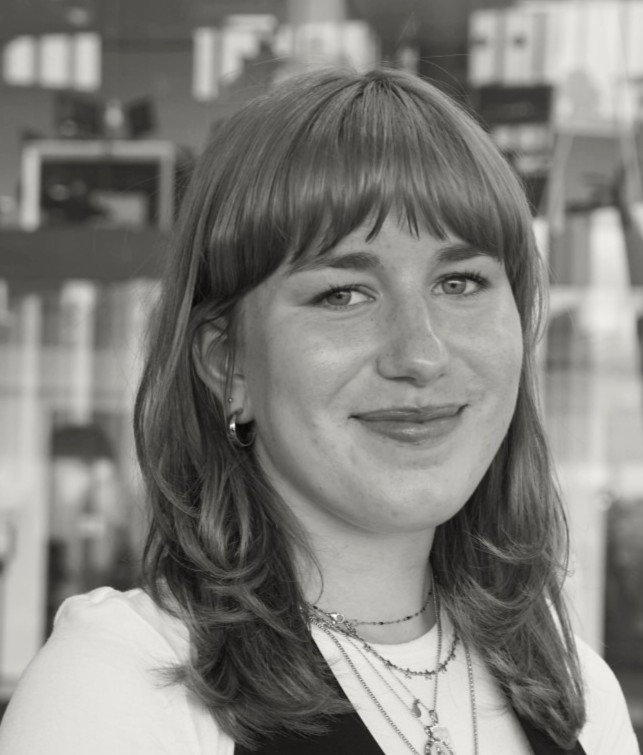
In this post, Christina Butt shares her research findings that explore how reflective portfolios play a critical role in fostering independent learning and demonstrating work readiness. She highlights an interesting gap between university-based professional skill development and students’ perceptions of their readiness for the professional world. Christina is a 2025 graduate of the University of Edinburgh in Biological Sciences, with a specialisation in Biochemistry. This presentation is part of the ‘Transformative Assessment and Feedback’ Learning and Teaching Conference series.
I have always been interested in exploring how to better support students throughout their academic journey. However, it wasn’t until my final year of undergraduate study that I realised this kind of meaningful research was possible within the field of Biological Sciences. As I delved deeper into this subject, I began to investigate something often overlooked in STEM fields: the role of reflective portfolios (RP) in student development. I presented this research at the University’s 2025 Learning and Teaching Conference.
Specifically, my dissertation research examined how these portfolios are perceived by students to influence academic success, professional skills, and career aspirations. Particular focus was also given to exploring how to increase the accessibility of skill development. What my research discovered, and what I will share with you here, is relevant not only to the Biological Sciences but also applicable across all disciplines. This research offers practical insights into how we can better support all students, regardless of their background, in developing the skills and confidence needed for life beyond university.
What are Reflective Portfolios (RP), and why is there a need to learn more about them?
In the School of Biological Sciences (SBS), RP are tools that students use to document their academic progress and skill development [1,2]. These reflections encourage students to evaluate their learning experiences critically, connect them to future goals, and develop a sense of professional identity [3]. This was an approach that was specifically designed for the student demographic in these courses.
But RP application in STEM disciplines is still evolving, and due to their recent emergence, I felt that, within this research, it is important to explore further how RP plays a critical role in fostering independent learning and demonstrating work readiness; key attributes for students’ future progress, and becoming scientists [1,2].
Three core questions guided my research for my Honours project:
- How do RP courses influence the development of professional skills in Biological Sciences students?
- What are the key benefits and challenges of implementing RP?
- How can these findings help us better support students from Widening Participation (WP) backgrounds?
What is the School of Biological Sciences Reflective Portfolio?
At SBS, RPs were introduced to help students explore and develop their professional growth. Initially, the aim was to assist students in becoming comfortable with reflecting on their experiences, and then to extend this by applying those reflections to make informed decisions about their future studies and careers.
Methodology: What did I do?
Given the timeline of this research, I wanted to make sure my analysis wasn’t based on just a single source. My goal was to capture and represent as many student voices as possible to give a more well-rounded picture of the use of RP.
I analysed 275 RP entries from the 2023–2024 Biological Sciences cohort. Additionally, I designed and conducted a survey, receiving 264 responses.
The survey data showed a clear trend: from the first to the third year, there was a steady increase in students’ positive responses to whether they were given opportunities to develop their professional skills. Interestingly, the decline in positive responses among fourth-year students appears to be influenced by limited exposure to updated curricula and a lack of introduction to RP, partly due to the disruption caused by COVID-19.
I conducted 20 in-depth interviews with students from all year groups and WP backgrounds, as well as with academic staff. Each student had the opportunity to volunteer to be interviewed in the survey and then discuss during the interviews. This mixed-methods approach enabled me to identify both quantitative trends and qualitative insights.
The study revealed an even more surprising outcome: across all year groups, students responded more positively to the question about their professional skill development at university than to whether they feel prepared for the professional world. This raises a critical question: if students believe they are gaining skills, why don’t they feel ready to apply them after graduation?

What we learned and what it means for students
This gap between university-based professional skill development and students’ perceptions of their readiness for the professional world became the focus of our interviews.
Many students said that working on RP gave them a clearer understanding of how their skills had developed, which made it easier to compile their CVs and explain why they were suitable for jobs or internships. Since fourth-year students hadn’t had much experience with RP, they discussed how something like a skill matrix could be useful, not just for becoming job-ready, but also for making more informed decisions when choosing their Honours specialisation.
However, based on the interview results, students still lacked confidence in the structure of the reflective process. There’s a need for greater time investment in delivering teaching sessions on introducing the value of reflection in portfolios. This could also be supported with more prompts in RP questions, providing a deeper context for skill development.
When we observe the gap in students’ beliefs – that they are gaining skills but do not feel prepared to apply them after graduation – this could be addressed by including an RP section on networking and its relation to communication. Specifically, students expressed concerns about a lack of support, professional development, connections, and skill building. Some of them mentioned:
“Coming from a lower socioeconomic background, I am not aware of skill development.” – Second-Year student
“The inequalities of the backgrounds coming into Biological Sciences: it gets maintained or worsened.” – Fourth-year student
When asked if there was any specific resource that students would need, it was suggested that they were given an initial resource before they were asked to engage with RP, where they were introduced to the skills, their context at university, and the real world.
Overall, this study demonstrates that RP can support students’ development in other key areas. It can help them recognise their skills and reflect on how those skills can be used in job applications for science or other career paths.
This also contributes to the conversation about RP’s role beyond just coursework and assessment. Since the students we spoke to were only partway through their RP experience, there is a clear opportunity for future research to follow development before and after RP exposure. It could also be interesting to observe students over several years to see if earlier exposure to RP helps them feel more confident and career-ready by the time they graduate.
More information about the SBS reflective portfolio can be found at the following link: Embedding a reflective portfolio for student development in science courses: Challenges, suggestions, and solutions, by Dr Alison Cullinane.
References
[1] Palmes, Harry, Reflective Portfolio: An Educational Tool in Senior High School Biology Instruction (July 12, 2024). Available at SSRN: https://ssrn.com/abstract=4895075 or http://dx.doi.org/10.2139/ssrn.4895075
[2] McQueen, H. A., Abou Jawad, F., Cullinane, A., & Darmon, E. (2025). Creativity embedded in the biology curriculum. Journal of Perspectives in Applied Academic Practice, 13(1), 130–148. https://doi.org/10.56433/4h8jzk22
[3] Moon, J.A. (1999). Reflection in Learning and Professional Development: Theory and Practice (1st ed.). Routledge. https://doi.org/10.4324/9780203822296
 Christina Butt
Christina Butt
Christina Butt (Gladko) is a 2025 graduate of the University of Edinburgh in Biological Sciences, with a specialisation in Biochemistry. Her undergraduate thesis on accessibility to professional development for Biological Sciences students was presented at the Learning and Teaching conference and contributed to curriculum reform. During her studies, Christina carried out research at the University of British Columbia on enhancing access to science education. She also took part in a conference, co-hosted by Harvard University, where she contributed to discussions with the UN Women lead on integrating AI simulations into education. Recognised for her leadership, Christina was named one of the Rolls-Royce Top 10 Undergraduates of the Year, and nominated for the Social Mobility Champion award for her dedication to educational equity and student empowerment.


